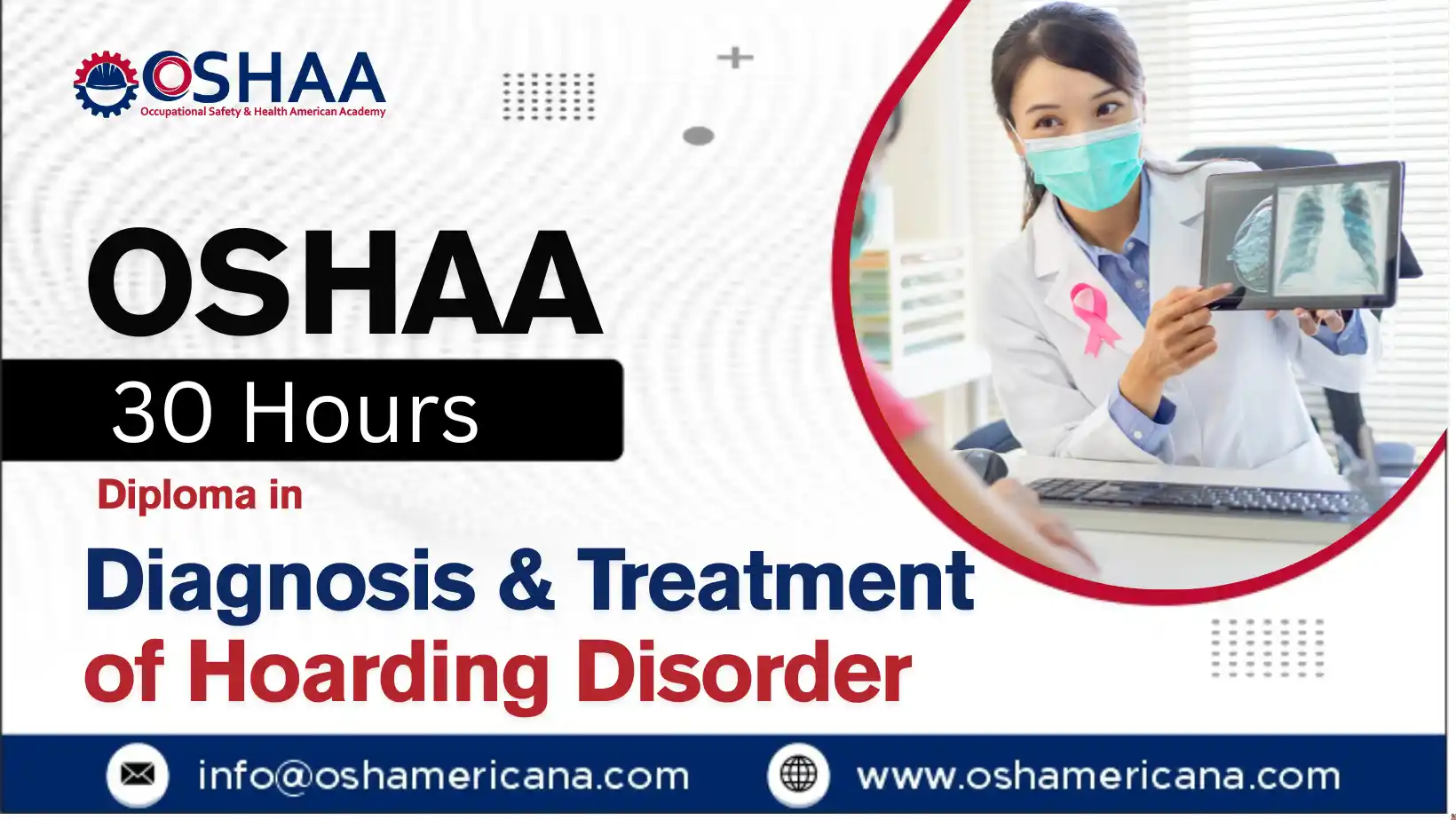The increasing awareness of mental health and behavioural conditions has brought hoarding disorder into greater focus. As a recognised mental health issue, hoarding can severely impact an individual’s well-being, personal safety, and living conditions. The OSHA 30-Hour Diploma in Diagnosis and Treatment of Hoarding Disorder offers a specialised training path for professionals seeking to understand, assess, and effectively treat this complex disorder.
Hoarding disorder is a persistent difficulty in discarding or parting with possessions, regardless of their actual value. This often results in cluttered living spaces, compromised safety, and reduced quality of life. Unlike general clutter or collecting, hoarding is characterised by a strong emotional attachment to possessions and a significant distress at the thought of discarding them.
The OSHA 30-Hour Diploma in Diagnosis and Treatment of Hoarding Disorder is more than just a qualification; it is a vital step towards building safer, healthier communities. With hoarding cases on the rise and their social impact growing, there is a pressing need for trained professionals who can make a real difference. Whether you are looking to specialise in mental health care or expand your skills in a multidisciplinary role, this diploma offers the knowledge and practical tools to excel.
OSHAA 30-Hours Diploma in Diagnosis and Treatment of Hoarding Disorder
Study Units
Learning Outcomes
Introduction to Hoarding Disorder: Definitions, History, and Prevalence (3 hours)
- Define hoarding disorder and differentiate it from other related behaviours
- Outline the historical development and recognition of hoarding as a mental health condition
- Describe the prevalence and demographic patterns associated with hoarding disorder
- Identify the social and health implications of untreated hoarding behaviours
Psychological and Neurological Basis of Hoarding Behaviour (4 hours)
- Explain the cognitive and emotional drivers of hoarding behaviour
- Discuss the role of brain function and neurodevelopmental factors in hoarding
- Identify common psychological comorbidities linked with hoarding disorder
- Analyse behavioural patterns and thought processes typical of individuals with hoarding disorder
Diagnostic Criteria and Assessment Tools (DSM-5, ICD-11) (5 hours)
- Accurately apply DSM-5 and ICD-11 criteria for diagnosing hoarding disorder
- Use validated screening and assessment tools in a clinical or community setting
- Distinguish between hoarding disorder and other obsessive-compulsive or mental health conditions
- Document assessment findings professionally to support treatment planning
Risk Evaluation and Safety Concerns in Hoarding Environments (3 hours)
- Conduct risk assessments in hoarded living spaces with a focus on health and safety
- Identify fire hazards, structural risks, and hygiene concerns
- Recognise safeguarding issues involving vulnerable individuals
- Develop strategies to manage and mitigate immediate environmental risks
Therapeutic Approaches: Cognitive Behavioural Therapy (CBT) and Motivational Interviewing (4 hours)
- Understand the core principles and structure of CBT for hoarding disorder
- Apply motivational interviewing techniques to support client readiness for change
- Select appropriate therapeutic interventions based on individual client needs
- Evaluate the effectiveness of different approaches in achieving behavioural change
Developing and Implementing Individualised Treatment Plans (6 hours)
- Create tailored intervention plans based on assessment outcomes and client goals
- Set realistic, measurable treatment objectives in collaboration with clients
- Incorporate harm reduction, decluttering schedules, and behavioural strategies
- Monitor progress and adjust treatment plans to maintain engagement and effectiveness
Working with Families, Carers, and Support Networks (3 hours)
- Engage families and carers in the treatment process respectfully and ethically
- Educate support networks on hoarding disorder and their role in recovery
- Address conflicts and challenges arising within family dynamics
- Build a supportive environment to sustain long-term change
Multidisciplinary Team Collaboration and Case Management (2 hours)
- Coordinate effectively with healthcare providers, housing officers, and social services
- Develop and participate in integrated care plans
- Maintain professional communication and information-sharing practices
- Understand the importance of follow-up and continuity of care through case management
- Provides in-depth, specialised knowledge of hoarding disorder aligned with international diagnostic standards (DSM-5 and ICD-11)
- Equips participants with practical skills to assess, treat, and manage complex hoarding cases
- Enhances professional credibility in mental health, social care, housing, and public safety sectors
- Offers comprehensive training in therapeutic methods such as Cognitive Behavioural Therapy (CBT) and motivational interviewing
- Promotes safe and ethical practices in risk assessment and environmental hazard management
- Strengthens ability to work collaboratively with multidisciplinary teams, families, and community organisations
- Supports Continuing Professional Development (CPD) with a recognised 30-hour certification
- Increases employment and career advancement opportunities within public health, social work, and behavioural therapy fields
- Fosters greater understanding of safeguarding, legal responsibilities, and ethical boundaries in hoarding interventions
- Available in flexible delivery formats to accommodate working professionals and diverse learning needs
The OSHA 30-Hour Diploma in Diagnosis and Treatment of Hoarding Disorder is designed for professionals and practitioners who work directly or indirectly with individuals affected by hoarding behaviours. It is ideal for:
- Mental health professionals, including psychologists, counsellors, and psychotherapists
- Social workers and case managers supporting vulnerable populations
- Community support and outreach workers involved in mental health and housing services
- Occupational therapists and healthcare professionals working in home or clinical settings
- Housing officers, environmental health practitioners, and tenancy support staff
- Emergency service personnel encountering hoarded environments during interventions
- Safeguarding officers and adult protection coordinators
- Support workers and carers working in domiciliary or residential care
- Non-profit and charity staff involved in homelessness, mental health, or welfare services
- Anyone seeking to develop specialist skills in behavioural health and public safety management
This course is suitable for both experienced professionals looking to expand their expertise and individuals new to the field who wish to build a strong foundation in understanding and managing hoarding disorder.







